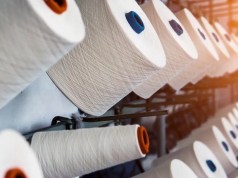Soaring export receipts from the country’s apparel sector still largely depend on limited items keeping its future sustainability in the global market at a stake, industry insiders and experts have said. Currently, more than 78 per cent of the sector’s earnings come from shipment of only five items namely shirt, trouser, jacket, T-shirt and sweater though Bangladesh exports more than 30 types of products. Bangladesh fetched $25.49 billion from knit and woven exports in fiscal year 2014-15 while only five items contributed $20.04 billion, according to data of the Export Promotion Bureau and the Bangladesh Garment Manufacturers and Exporters Association (BGMEA). The total export earnings stood at $31.198 billion in last fiscal while garment accounted for 81.71 per cent of the total, according to data. Overseas sales of local garment products are also mainly limited to four major destinations-the EU, US, Canada and Japan, they added. Experts and exporters attributed the demand for those products in the global market, large-scale and long work orders even for a couple of years and cotton-based products to dependency on such a few items. Moreover, lack of effective efforts for product diversification and new market exploration and shortage of specialised skilled workforce, poor infrastructure and entrepreneurs’ unwillingness to take risk also are responsible, they mentioned. They said neither the number of export items nor of export destinations of the country is increasing, and such a dependency on single sector and few items might put the overall export earnings at a risk. Experts and exporters said the government should come forward with a plan of action to increase competitiveness of local products including non-RMG items and explore the untapped markets across the world. The plan should address present energy situation and low infrastructure facilities in the country, they suggested. They said the government’s policy support is needed to change the entire export scenario, including opening of new missions, branding of local products, and cash support for potential sectors etc. Former President of Bangladesh Knitwear Manufacturers and Exporters Association (BKMEA) Fazlul Hoque attributed such dependency on few items to unwillingness of entrepreneurs and set demands for the basic items across the globe. “It has both positive and negative impacts,” he added. “We have developed our expertise and become world leader in those items,” he said adding: “But we are yet to make a strong foothold as we are confined to limited items.” He also held responsible such dependency on a single sector and a few items for stagnant growth in export earnings in recent times. China is still the number one in exports as it produces all types of products with a wide range of variety, he noted. “If we want to increase our global market share and grow further, there is no alternative to both product and market diversification,” Mr Hoque opined. Faruque Hassan, senior vice president of the BGMEA said apparel-makers are gradually switching over to mid-and high-end products from basic ones and there are many value-added segments in those five basic items. This helps the makers to cope with the price pressure and maintain the growth, he added. For example, sweater makers are now installing Jacquard machine for more value addition to their items, he added. To achieve the $50 billion export target by 2021, product diversification is a must while we need to produce more value-added items like lingerie, suit and sportswear, former BGMEA president Md Atiqul Islam said. Huge investment with heavy machinery is needed for high value-added products, said Md Shahidullah Azim, managing director of Classic Group. He sought the government’s policy support including single-digit bank interest and smooth supply of gas and electricity for attracting investment in high-end product manufacturing in the country. Additional research director of Center for Policy Dialogue Khondaker Golam Moazzem said in the long run it might not be possible to be cost competitive without enhancing wages. Bangladesh will also not get GSP facility when it becomes a middle income country, he said adding, to sustain its competitiveness in the long run, product diversification has no alternative, he opined.
RMG BANGLADESH NEWS
A Knowledge-based Initiative of Best Sourcing
Ready Made Garments sector is the key source of foreign currency and GDP for Bangladesh. Approximately 4.2 million people are dependent on the RMG sector for their bread and butter.
Ready Made Garments sector is the key source of foreign currency and GDP for Bangladesh. Approximately 4.2 million people are dependent on the RMG sector for their bread and butter.
Contact us: info@rmgcentre.com
© Copyright 2019 - RMG Bangladesh
















